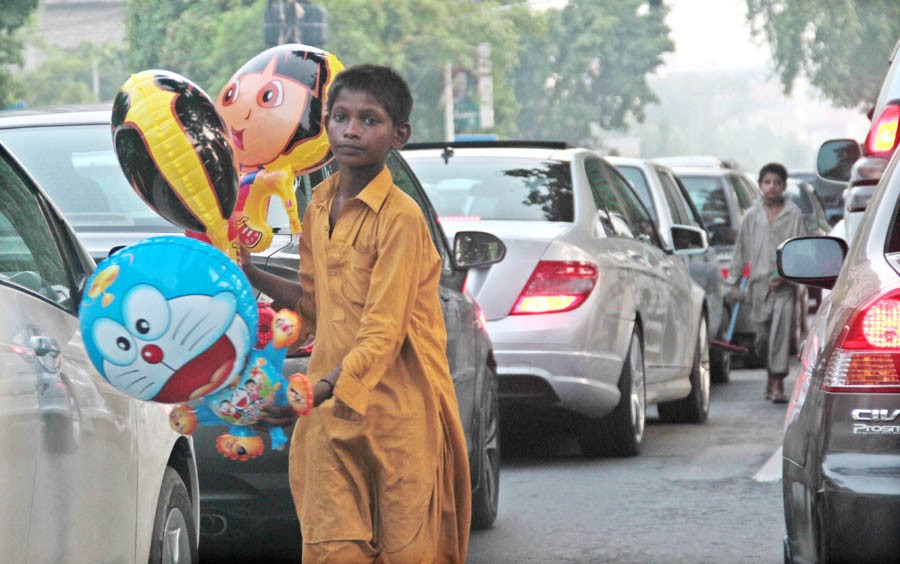
Young children are routinely found begging in the streets. What is even more disturbing is the fact that there is a powerful gang backing them, their parents included

It was a cold and foggy January morning. A 10- year-old boy, in tattered clothes, was spotted at a traffic signal on the Mall Road, running from one car to another, begging for alms. He would occasionally get a coin or a 10-rupee note, but mostly a snub.
A team of Child Protection Welfare Bureau (CPWB) Punjab, accompanied by a special squad of police, happened to notice the boy and caught him. In no time, a bunch of people had appeared out of nowhere and attacked the team, badly hurting the elbow of a CPWB member. It turned out that they were all related to the boy.
That the boy was later taken in custody, an FIR was registered, and the attackers were arrested, is history. The fact remains that there are many such young children to be found in the streets, engaged in begging. What is even more disturbing is that there is very often a ‘mafia’ or a powerful gang backing them. The parents of most of these children also push them in the activity. These are ‘professional’ beggars.
These beggars routinely change their locations (adda, in vernacular). Niaz (real named changed) lives in a slum in Sabza Zaar. He says he launches his children at different addas every now and then. This helps them escape the notices of the policemen who often allegedly demand a "parchi (token amount) of Rs1,000 a month for letting us use the adda."
According to Niaz, the trick is to evoke pity, and the sight of children in bad condition makes perfect bait. Moreover, the minors are not considered professional beggars, so the common people are often misled.
Waseem Abbas, a spokesperson for CPWB, claims that crackdowns are routinely carried out against the beggars -- "twice a week." Before every operation, the CPWB takes Home Department, Punjab Police, Traffic Police and the City District administration on board.
"Most families of these professional beggars are mostly nomads," he tells TNS. "Each family has a number of children. The elders do nothing to earn bread, so they send their children out begging.
"Every child usually earns home Rs200-500 a day. This makes a decent combined total for the family."
Niaz feels no shame in begging. "The government does not provide us with food when we are hungry. We have no place to shelter. But who cares? If my children do not go begging, my ailing wife and I won’t be able to survive.
"Of course, our children are dear to us," he says. "They are our support in rainy days. If they are caught, we will obviously resist."
Last year, the Child Protection Welfare Bureau, in collaboration with the City District Government Lahore, and Punjab Police, launched a full-fledged anti-beggary drive. A special team raided different localities of the city including the Campus Bridge, Barkat Market, Moon Market, Kareem Block Market, Main Market Gulberg, Defence Morr, Y-Block, H-Block, Model Town, Johar Town, Sandha Kalaan, Sabza Zaar, River Ravi’s bank, and katchi abadis.
Fatima Sheikh, Director General (DG) CPWB, speaks of having rescued more than 7,000 children since January 2016. "The children were generally aged between 5 to 14 years. They were shifted to the Child Protection Institute where they are given free meals and shelter. Additionally, some of these children were set free after issuing warnings to their parents. In some cases, the parents were also fined.
"The children were taken into protective custody after getting approval from the judiciary."
Sheikh says that the mafias are no longer running the beggars’ dens, "We see a different trend now; the young ones are compelled to beg in the streets under cover of selling flowers or wiping the windscreens of traffic vehicles." She promises to "counter all kinds of beggary, direct or indirect."
A City District Government Lahore official says the anti-begging campaign was purely a subject of the CDGL but now it has been handed over to the Social Welfare Department which has no budget to run the campaign.
He also claims that the CDGL has stopped its campaign and the number of beggars has gone up. "You just can’t miss them at the traffic signal of any busy street of Lahore."